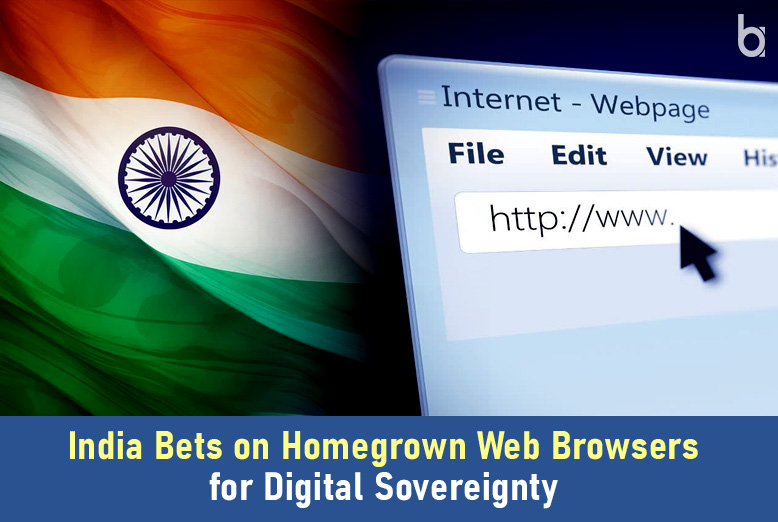Business APAC
March 26, 2025
India is making a real push to get its Indian web browser off the ground and into the hands of its citizens. This comes as folks worldwide are getting increasingly concerned about the big tech players from overseas and the ever-present risk of our info getting exposed—a situation that highlights the tough Indian Web Browser Development Challenge.
While the government hasn’t exactly laid out all their cards yet, sources in the know suggest the MeitY (Ministry of Electronics and Information Technology) is exploring a bunch of ways to make a truly viable Indian web browser a reality. This could mean putting money into research and development, teaming up with local tech companies—maybe the likes of Zoho Corporation, Team PING, and Team Ajna—as well as getting universities on board. You can also bet on public awareness campaigns to get the word out about using an Indian web browser.
What’s Driving This Whole Thing?
The main thing pushing this forward seems to be the growing unease about how international companies handle the data of Indian internet users. With so many of us online, India’s a massive market for tech companies from all over. But that also means a huge chunk of our sensitive information is being looked after by companies that aren’t directly under India’s thumb, emphasizing the need for stronger data protection. This whole effort is a key piece of India’s ambition for digital self-reliance by building a solid Indian web browser.
“Look, we must have our Indian web browser in today’s digital world,” a high-ranking official from the MeitY said, off the record. “We’ve got to make sure our people’s data is safe and that we have more say in how our online systems work. Just relying on browsers from other countries could leave us wide open to problems, even some tricky geopolitical stuff.“
Beyond just keeping things secure, this also fits neatly into the bigger picture of Atmanirbhar Bharat and the “Make in India” and “Digital India” initiatives, all aimed at boosting Indian technology innovation and cutting down how much we rely on foreign tech.
If we can get a good Indian web browser ecosystem going, it could mean more jobs, a burst of new ideas, and a real shot in the arm for our local tech scene. Word on the street is that folks like Ashwini Vaishnaw, the Minister for Electronics and Information Technology, are championing this cause of getting an Indian web browser built.
Plus, the folks who are all for this point out that an Indian web browser could be specifically designed to fit what Indian users need. Think better support for our many languages, easier ways to access local services, and features that tackle the unique challenges of getting online and using the internet across India.
The Tricky Bits: What’s the Challenge?
But let’s be real: getting an Indian web browser up and running and getting people to use it is going to be tough. Building a modern web browser from scratch is seriously complicated, needing top-notch skills in things like how websites are displayed, security smarts, and making it easy and enjoyable to use. India’s going to need to find and nurture a lot of talented people in these areas to overcome the Indian Web Browser Development Challenge.
“It’s going to be a real uphill battle to get Indian users to ditch their current browsers,” noted Rohan Sharma, a tech analyst in Mumbai. “The new Indian web browser will have to seriously impress in terms of speed, security, how easy it is to use, and whether it plays nicely with everything else to even get a look-in. But even before all that, we can’t forget just how technically challenging it is to build a solid and competitive Indian web browser in the first place.”
Sharma went on to say, “The big global browsers have had years, even decades, of constant work and loads of cash poured into them. Indian developers, including maybe teams at Zoho Corporation, Team PING, and Team Ajna, will need serious resources—both money and brainpower—to even start to catch up in the Indian web browser game. And let’s not forget, keeping up with the ever-changing web and staying ahead of security threats will be a constant grind, demanding a laser focus on data protection for any Indian web browser.“
Building Trust and Momentum for Indian Web Browsers
Getting a good collection of add-ons and integrations going—something people expect from their browsers—will also be key for any Indian web browser. On top of that, getting users to trust these new, homegrown options and believe they’re safe and reliable is going to be a major hurdle in this journey toward digital self-reliance and hitting the goals of Atmanirbhar Bharat through Indian technology innovation in creating an Indian web browser.
Notably, Zoho Corporation won the landmark challenge, which could give a real boost to these efforts. Despite these significant challenges, the government seems pretty serious about this. Industry watchers are expecting more announcements and policies in the coming months that will offer real support for getting an Indian web browser developed and out there.
This move could shake up India’s digital scene and might even inspire other countries looking for more control over their online worlds. Whether it all works out will depend on whether Indian tech companies can come up with browsers that can go toe-to-toe with the big global players while truly meeting the needs of the Indian people, all while tackling those tricky technical and adoption challenges in the Indian web browser space.
Here’s the gist of why India’s pushing for its web browsers:
- Keeping Our Data Under Wraps: A big reason is worry about how browsers from other countries handle our private stuff.
- Taking the Reins Online: India wants more say and control over its digital world and how it runs (digital self-reliance).
- Helping Our Tech Grow: This is part of bigger national plans like Atmanirbhar Bharat and “Digital India” to help our tech industry get stronger (Indian technology innovation).
- Browsers Made Just for Us: There’s a chance to build an Indian web browser that’s a better fit for Indian users, with support for our languages and local services.
- Good for Jobs and Ideas: Building our Indian web browser could mean more jobs and new thinking in the Indian tech world.
- Less Dependence on Others: India wants to rely less on tech from other countries for things like browsing the web.
Also Read:












